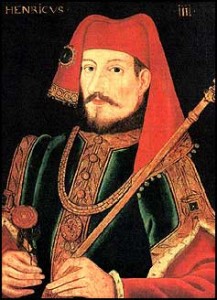
A Portrait of King Henry IV. To what extent can we ascertain the real man through Shakespeare’s play?
For those new to Shakespeare’s history plays, a swarm of confused questions accompanies the opening passages of I Henry IV, even as the masterful strokes of drama and debauchery tempt readers and viewers into its universe: What, in claiming history, is Shakespeare actually representing? Would the King have spoken anything like this, or any of the characters for that matter? How much of this is factual, or how much fact is even possible in an early modern society with limited literacy to record history? What impulses or visions direct the embellishments? Simply put, what can one confidently tell a friend about history after reading Part I of Henry IV? These questions are more easily left dormant in reading Shakespeare’s other fictional plays, with the casual assumption that the fictions of the play stage fantasized elements of Shakespeare’s real environment. But in a play that aspires to historicity, some theoretical framework is needed to comfortably reconcile this tension between fiction and history.
A little prodding soon reveals that entire fields of literary study exist to answer this question. The field that most directly aims to balance history with textually, in which neither can be entirely determinant, is aptly dubbed new historicism. According to online resource (by the esteemed publishers at Bedsford/St.Martin’s), new historicism revives the role of history in shaping and determining literary events, but with a caveat of skepticism: “They are less fact- and event-oriented than historical critics used to be, perhaps because they have come to wonder whether the truth about what really happened can ever be purely or objectively known”.
Rather than presuming that the events of a historical fiction are just representations (or imaginative consequences, in the case of full fiction) of something that has undeniably happened, New Historicism posits that “we have been conditioned by our own place and time to believe that it was” (all quotes from the same source, until otherwise noted) With history no longer a single, definite entity towards which authors and critics must aspire, the new task, then becomes disentangling the elements and sources of these fabrications and narratives. Rather than seeking the exact truth, the prudent New Historicist critic seeks factors: the voice responsible for this history, what the narrative adapts, and how it spins the matter. “Thus, when new historicist critics describe a historical change, they are highly conscious of (and even likely to discuss) the theory of historical change that informs their account”. Rather than recreations or reiterations of “a single or easily identifiable historical context”, any number of factors or wills could recreate a distinct narrative.
Before concluding with some personal conjecture, a dutiful representation should mention the host of dissenting voices. In her book, “Shakespeare’s History Plays: Rethinking Historicism”(Edinburgh University Press, 2012), Neema Parvini offers and imagines multiple critiques alternatives to various New Historicist scholars. In the very first article, she derails some New Historicists on the grounds that their fidelity to “the organizing principle” of the “master-text of culture”, something external to themselves that can prove all the literature’s contents, their criticisms can become problematic (Parvini 19).
Though this is a radically unfounded claim of a neophyte to such ideas, in this sense of historical fabrication, perhaps Shakespeare viewed himself and his task as New Historicism to some degree. With the limited information available, perhaps Shakespeare was constructing or at least tweaking I Henry IV with shades of his own Elizabethan time- its opinions, infatuations, and culture. When history is seen as dictated and not factual, a plural product of constant contention, Shakespeare’s most audacious critique may be endeavoring to write the history plays themselves, proving that contemporary constructions of history are not entirely fact, but also an act.

